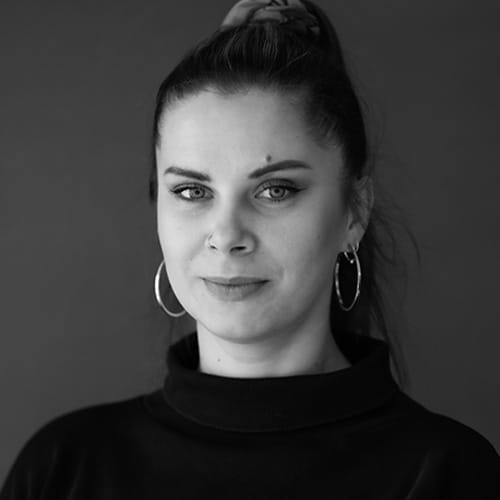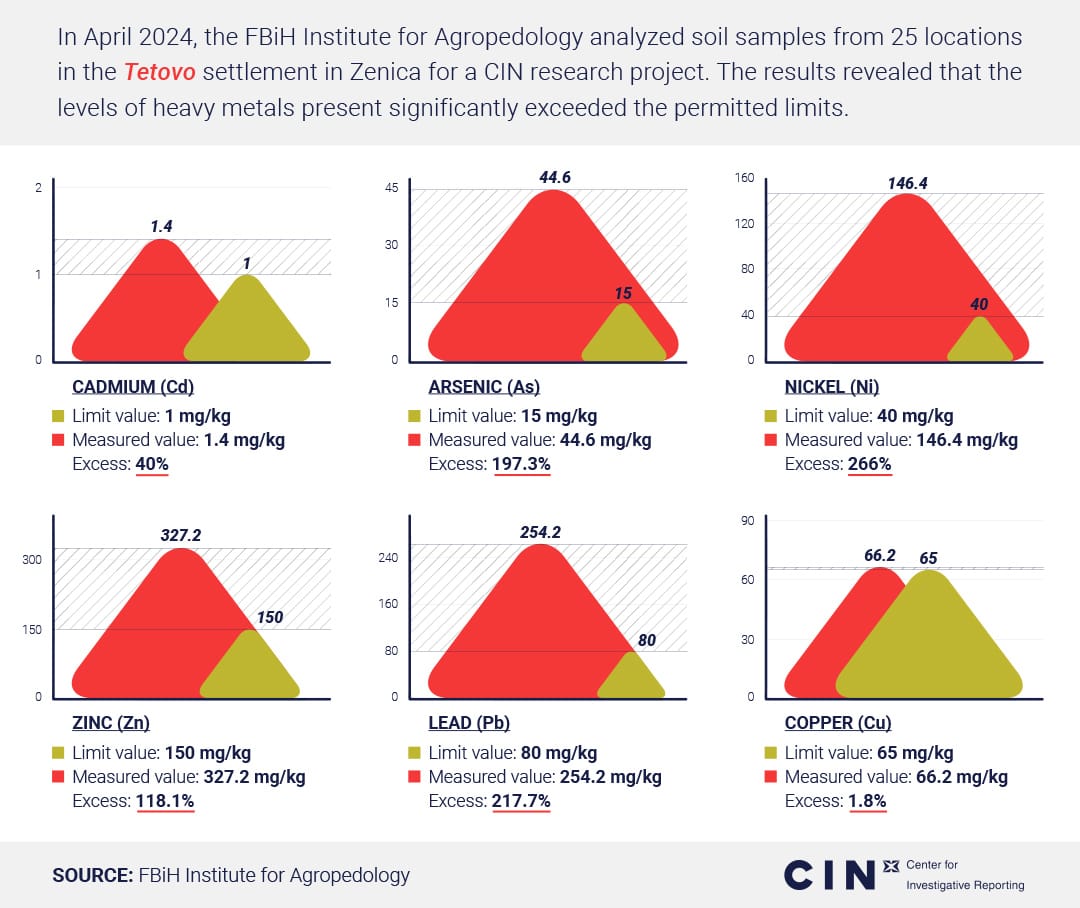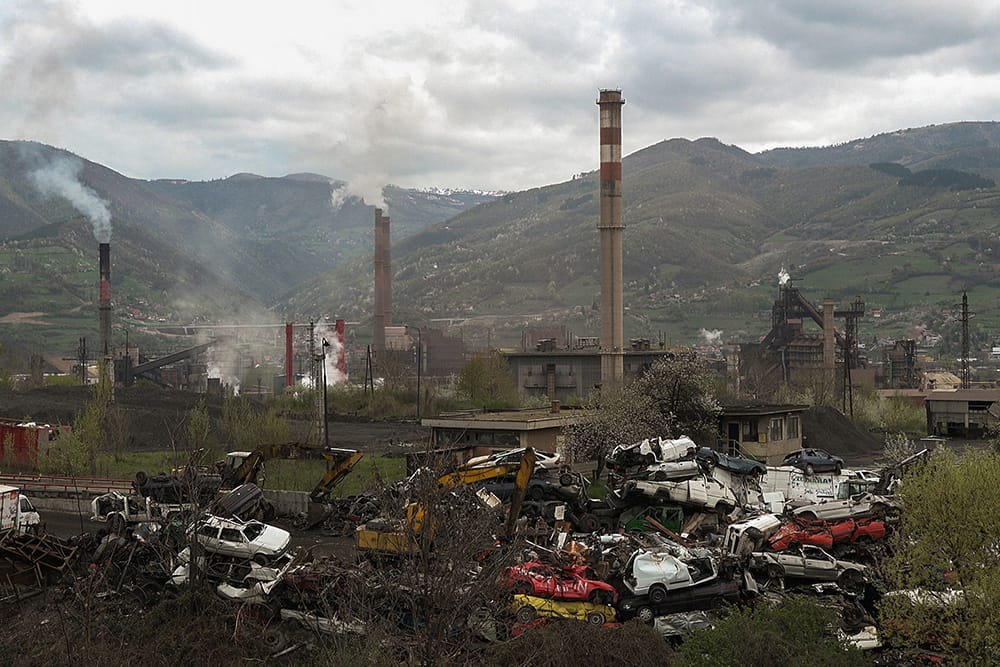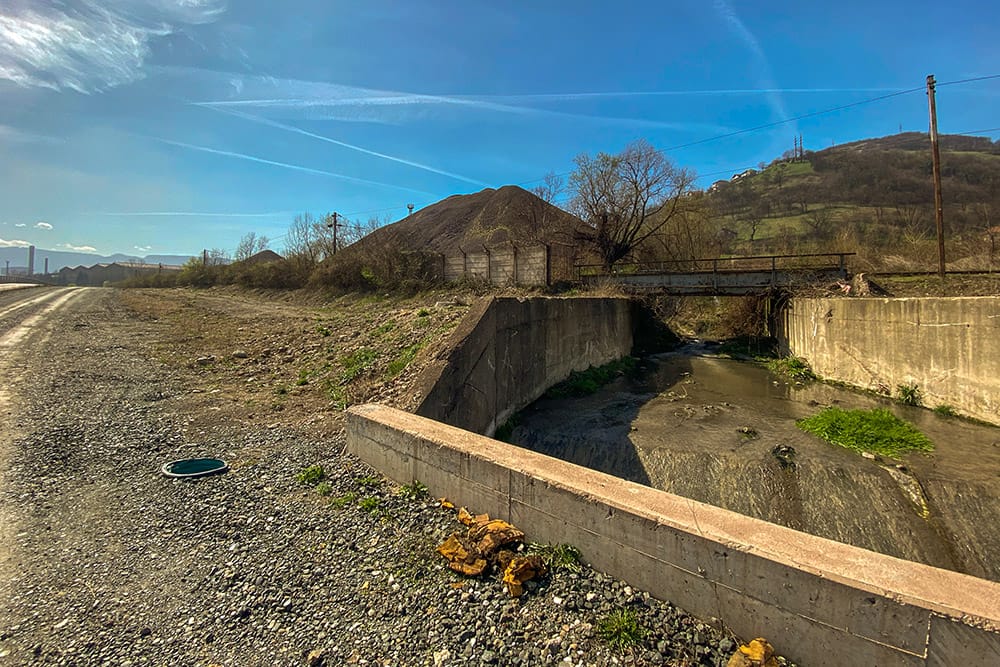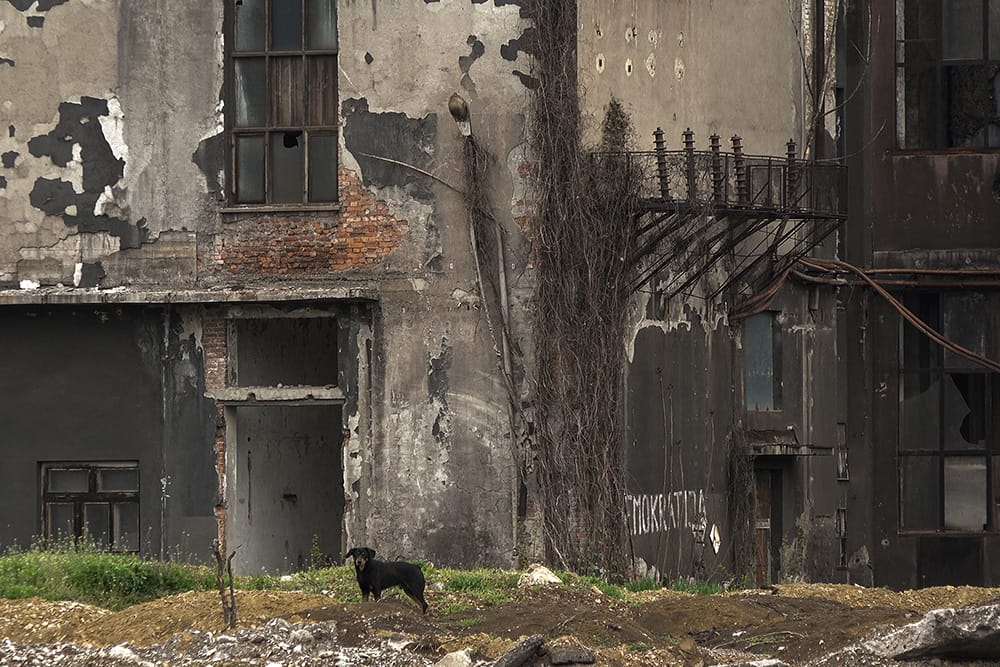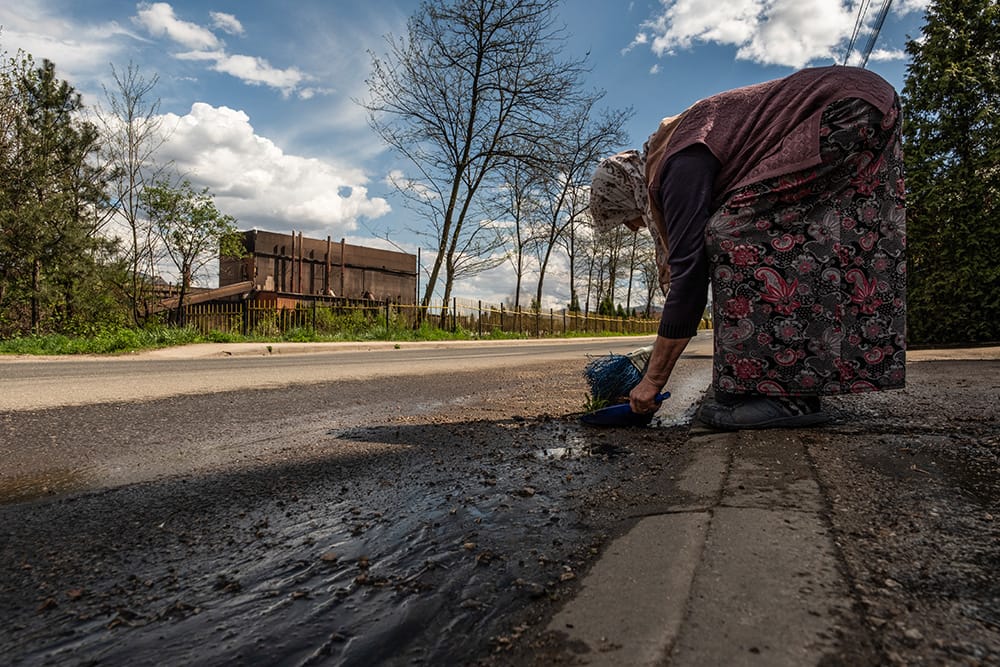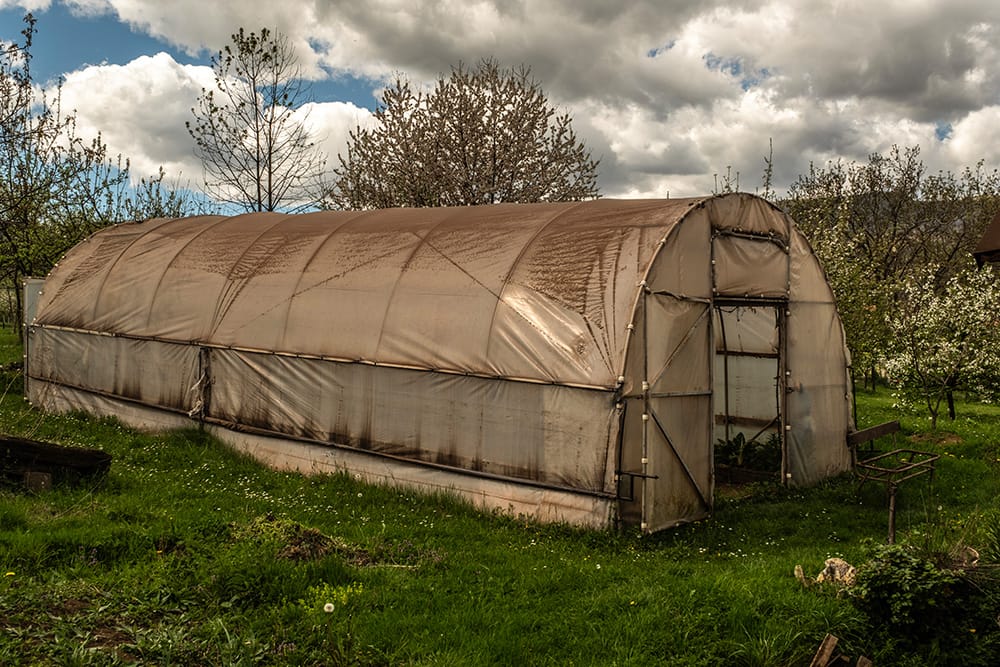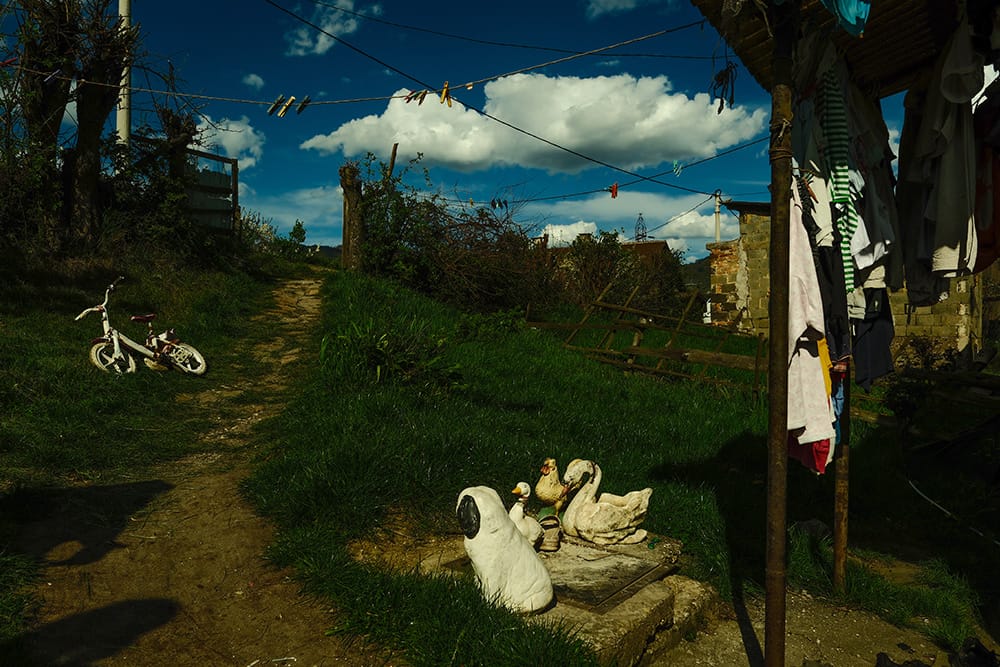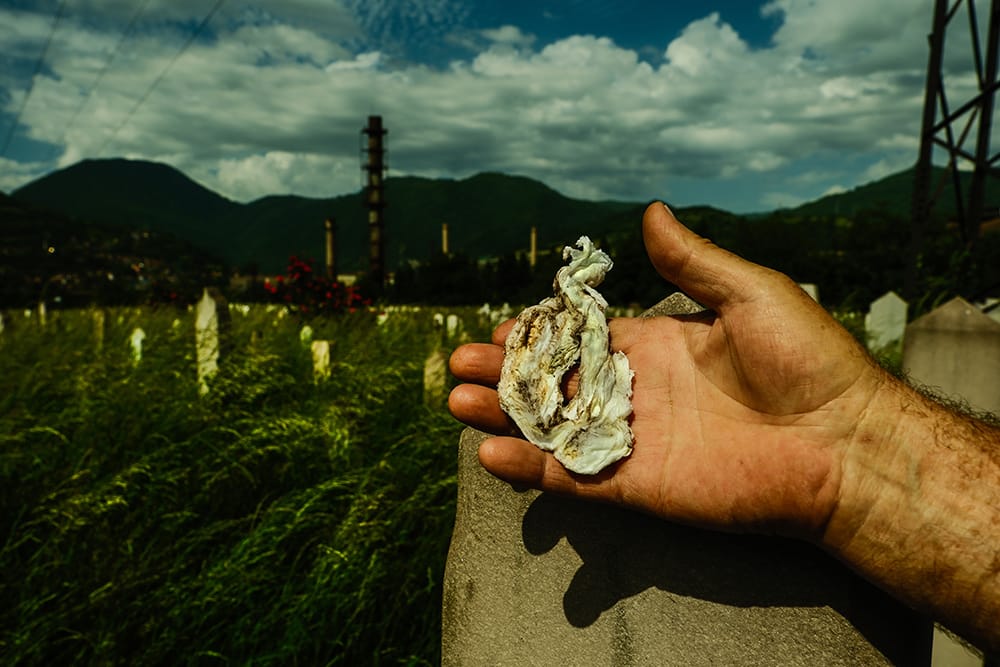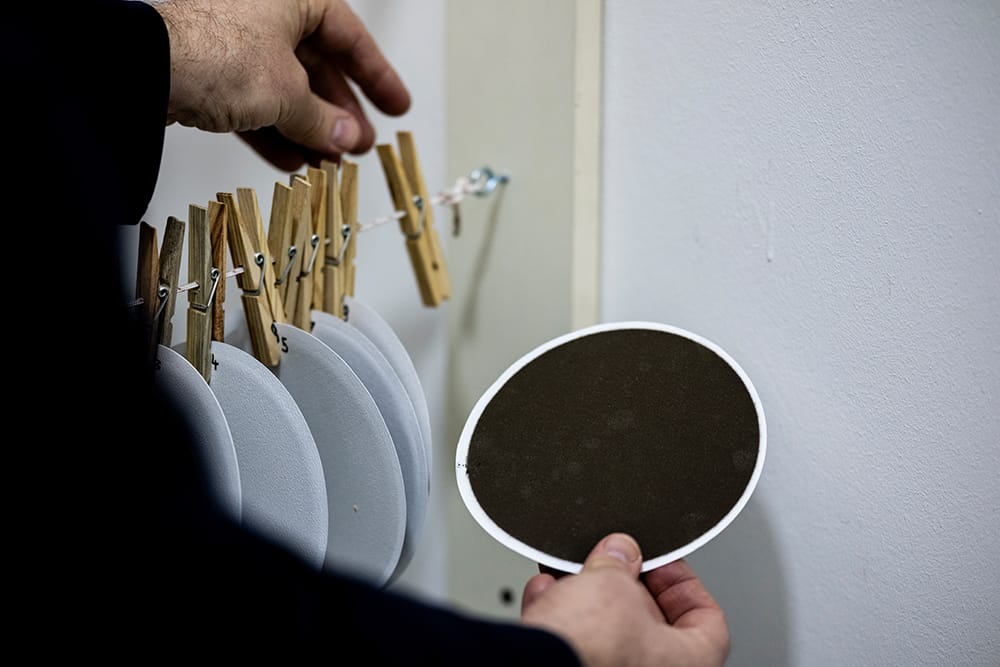The wide pastures and fields in the Zenica neighborhood of Tetovo create the illusion of a serene environment. Yet, this picturesque landscape is dominated by the towering chimneys of the steel mill, which have loomed over the area for more than a century.
For years, Tetovo’s residents, who live closest to the steel giant ArcelorMittal, have endured heavy air, foul odors, and nightly noise. The bitter taste of dust is apparent after just a few hours in this neighborhood.
“We’re used to it,” says Besim Dedić, a Tetovo resident, whom journalists from the Center for Investigative Reporting (CIN) found planting potatoes, despite knowing the risks of growing vegetables in his garden.
In March 2024, soil analyses conducted in the Tetovo and Pehare neighborhoods unveiled alarming levels of heavy metal contamination originating from industrial chimney emissions. The findings revealed elevated concentrations of arsenic, lead, zinc, cadmium, nickel, and copper, posing significant health risks to the communities residing there. The Institute for Agropedology of Federation of Bosnia and Herzegovina (FBiH), as part of CIN’s investigation, meticulously examined soil samples from 50 different sites, including gardens, schoolyards, healthcare facilities, religious establishments, and Tetovo and Pehare streets.
Journalists spoke with residents of these settlements, and all are aware of the pollution and dangers. However, they doubt that any change is possible, which is why only five of them decided to speak publicly about it.
Despite the Institute having alerted FBiH and local authorities to the soil pollution a decade ago, no action was taken to ban planting in this area or to initiate soil decontamination processes.
„Survival of the fittest. Last year, this local community had a population of 1,100 people; surely 80 died. Among those 80 is my wife. Colon cancer,“ said Dedić.
In 2022, expert air analyses carried out by the Kemal Kapetanović Institute in Zenica detected the presence of carcinogenic dust particles, specifically benzene and benzo[a]pyrene, in the air surrounding the steelworks. These particles exceeded the emission limit values (ELV) by up to 255 times.
According to CIN’s investigation, this company has violated nearly all of the 141 measures outlined in its environmental permit, with no indication of intent to comply with seven of these measures by the 2024/2025 deadline. Furthermore, it has consistently failed to meet obligations outlined in its initial contract with FBiH authorities dating back to 2004, when it acquired the steel plant for one dollar. Despite these breaches, the Government of the Federation of Bosnia and Herzegovina (FBiH) has not taken steps to revoke ArcelorMittal’s operating license, as it should have done.
The Government treads carefully to avoid actions that might strain relations with ArcelorMittal. They justify their reluctance to impose sanctions on the steel manufacturer by citing the employment of 2,000 individuals by the company. ArcelorMittal collaborates with hundreds of suppliers, indirectly providing jobs for 12,000 people. The Railways of Republika Srpska depend on business with ArcelorMittal Zenica for 50 percent of their annual turnover, while the Railways of the Federation generate nearly 30 percent of their revenue through collaboration with the company.
Therefore, since 2009, the company has been renewing its environmental permits with fines that have often been lower than those prescribed by law.
„In societies grappling with poverty like ours, it is straightforward. Emotions and social stability are at play. Investors prioritize profit. If we were to shut down Arcelor, the implications for both the economy and society as a whole remain uncertain,“ remarked Nasiha Pozder, the FBiH Minister of Environment and Tourism.

Steelworks for One Dollar
Lakshmi Mittal, an Indian entrepreneur, has amassed billions by revitalizing defunct state-owned steelworks around the globe. Today, he is known as the world’s foremost steel producer. However, beneath his business triumph lies a narrative of communities contending with environmental deterioration. Among these communities are over a hundred thousand residents of Zenica.
Mittal incorporated the Zenica steelworks into his conglomerate in 2004, acquiring a 51% stake for just one dollar from the FBiH government. This revelation comes from a capitalization agreement kept confidential by authorities. At the time, the government retained an 8% stake, while the remaining 41% was owned by the Kuwait Consulting and Investment Co. Over the years, ArcelorMittal went on to acquire the stake held by this company, eventually becoming the owner of 92% of the Zenica steelworks.
According to the contract obtained by CIN, Mittal has committed to annual steel production of at least two million tons, along with the employment of 4,000 to 4,500 workers, investing in environmental protection measures, establishing water purification and by-product plants, and installing emission control equipment, all in compliance with the laws of Bosnia and Herzegovina. However, the company has failed to fulfill any of these obligations, with authorities in FBiH turning a blind eye to these oversights. As a result, ArcelorMittal’s leadership displayed no concern during discussions with journalists.
“It doesn’t help you or me to go back in the past and question everything that has not been done in the past,“ said Nikhil Mehta, CEO of the company.
In 2007, ArcelorMittal launched integrated steel production in Zenica, which included the revival of the coke plant, a facility that had ceased operations in the early 1990s.
However, that didn’t happen. The coke plant continued operating beyond its projected lifespan, flouting both the scheduled shutdown and the regulatory frameworks governing such facilities, which are significant contributors to environmental pollution. Specifically, ArcelorMittal was using coke as an energy source to melt iron, consuming approximately half a million tons of this fuel annually. The combustion of coke results in the emission of gases and dust containing substantial quantities of harmful substances such as sulfur dioxide, nitrogen oxides, hydrogen sulfide, tar, benzene, benzo[a]pyrene, toluene, xylene, or ammonia, all of which pose health risks and can lead to cancer.
As a result of this pollution, ArcelorMittal pays an annual fee ranging from BAM 560,000 to 860,000 to the Environmental Protection Fund of the Federation of Bosnia and Herzegovina. The company is required to monitor pollution from its facilities to ensure it does not pose risks to human health and the environment. These obligations are governed by environmental permits issued by the authorities in the Federation of Bosnia and Herzegovina every five years. Without these permits, ArcelorMittal would not be able to operate.
Despite continuous measurements in the surrounding areas of Zenica revealing hazardous air and soil pollution due to industrial activities, there appears to be little concern or accountability for emissions originating from the factory premises.
„We all feel the consequences. The wind carries it, the water carries it. Eventually, it reaches us,“ explains FBiH Minister Nasiha Pozder.
ArcelorMittal does not dispute the emissions but asserts they are being managed effectively. According to Mehta, the company invested nearly 100 million euros in environmental projects. However, this narrative of investment is overshadowed by the recent environmental permit issued to ArcelorMittal by the FBiH government in late 2022. Inspection reports reveal that the company has not met deadlines for implementing over a hundred measures specified in the environmental permit, a fact corroborated by officials at the FBiH Ministry of Environment and Tourism in discussions with CIN journalists.
The company also failed to take steps to curb air emissions exceeding permitted levels, maintain and ensure the functionality of purification systems, conduct sufficient monitoring of air emissions, establish a waste management system for technological and hazardous waste within the factory grounds, educate employees on proper waste handling, devise an environmental protection management plan, adjust procurement practices for raw materials and chemicals to align with environmental regulations, obtain closure approval for the Rača landfill, or secure a new landfill site.
“They did absolutely nothing to comply with the environmental permit”, Minister Pozder stated, adding that “27 measures were somewhat initiated. You know how? They stated that the measures would be implemented by the end of 2023, with project documentation due by mid-2022. However, they’ve barely started on the project documentation.”
Confronted with the breach of measures, the ArcelorMittal CEO remarked, „We were too ambitious, thinking we could handle it.“

A commission, comprised of representatives from the FBiH Ministry of Environment and Tourism, the FBiH Administration for Inspection Affairs, and the FBiH Ministry of Agriculture, Water Management, and Forestry, initiated a review of ArcelorMittal’s environmental permit in early April 2024. Upon completion of their analysis, the commission will present its findings to the Government of FBiH, which will ultimately decide whether to maintain the company’s permit.
FBiH environmental inspector Muvedet Šišić, who conducted inspections at ArcelorMittal in 2023, noted in his report that the company shows no intention of implementing measures outlined in the environmental permit or enhancing production in alignment with environmental standards.
“The enforcement approach for these measures involves initiating misdemeanor proceedings, which, so far, haven’t yielded significant outcomes,“ Šišić noted.
Inspection records obtained by CIN journalists revealed that the company has paid numerous fines over the past six years, averaging around BAM 55,000 annually. Despite repeated breaches of the measures stipulated in the latest environmental permit, inspectors have never imposed the maximum fine of BAM 200,000. Both Inspector Šišić and Anis Ajdinović, Director of the FBiH Administration for Inspection Affairs, declined to comment to journalists.
„It’s cheaper to pay fines repeatedly than to make actual investments,“ remarked Minister Pozder.
Sowing Seeds in Contaminated Soil
In late March 2024, reporters from CIN gathered soil samples from 50 different sites across the Tetovo and Pehare settlements, adhering to prescribed procedures. The soil analysis was then carried out by experts from the FBiH Institute for Agropedology.
The test results revealed contamination in all soil samples with arsenic, lead, zinc, cadmium, nickel, and copper, surpassing the emission limit values in the FBiH by two to three times.
Ahmedin Salčinović, Assistant Director in the Department of Pedology and Land Reclamation at the FBiH Institute for Agropedology, explained to CIN that soil pollution in these neighborhoods stems from the spread of harmful particles during production within ArcelorMittal.
“Carried by the wind, these pollutants settle on the ground and linger there. Plants, especially lettuce, spinach, and other vegetables absorb heavy metals while taking in nutrients from the soil. Over the years of consumption, this can lead to the development of cancer and various diseases,“ stated Salčinović.
He further explains that residents who consume plants from contaminated soil may experience health consequences even after 40 to 60 years.
„We’re aware, we see it. Come to my yard down there to see how everything glitters, to see what filth it is,“ said Tetovo resident Ahmed Šišić.
Mirela Vehabović, another resident, describes regularly witnessing dust settling in the air towards nearby homes.
„I don’t know what it is, but it is somewhat orangie, stifling, you can’t walk. I have a child with special needs. When I try to take her out for a walk, I often have to turn back. Sometimes you can even smell gas, it’s suffocating,“ said Vehabović.
From 2011 to 2015, experts from the FBiH Institute for Agropedology continuously analyzed the soil in the neighborhoods around ArcelorMittal. Each year, they recorded excessive concentrations of heavy metals in the soil.
After five years of monitoring the soil, the Institute submitted reports to Zenica City and the Government of FBiH in 2015, designating the Tetovo, Pehare, and Gradišće neighborhoods as risk zones for cultivating plants intended for human and animal consumption. However, residents in these areas continue to plant fruits and vegetables, as the ban on planting has never been enforced.
„We issued the ban, we advised against planting. Yet people still do so. How and why, I don’t know. It should be the responsibility of Zenica City to enforce the ban, implement penalties and measures, or allocate alternative areas for planting,“ Salčinović explained.
The Zenica City authorities have not implemented any measures to prohibit planting. Ahmed Šišić, president of the Tetovo local community, noted the absence of pollution measurement results provided by the City.
Mayor Fuad Kasumović stated that „Zenica City lacks jurisdiction over Mittal“, placing responsibility on „the FBiH government and FBiH inspections“.
Meanwhile, data from the Institute for Public Health and Food Safety in Zenica indicates an uptick in malignant diseases, contributing to premature deaths and diminished quality of life. However, detailed health data for residents in neighborhoods surrounding the steel plant are currently unavailable.
“My wife passed away within nine days. She had cancer of the vocal cords, bloodstream, and liver. Within just nine days! I don’t need to say much more (…) It’s like Chornobyl II,“ Šišić concluded.

Mayor Kasumović acknowledges the increasing incidence of illnesses among the population but refrains from directly linking them to ArcelorMittal: „We lack jurisdiction, so I can’t demand anything. We have those job opportunities, knowing that flowers will never come out of those chimneys, that pollution will always persist.“
Neither the Government of the Zenica-Doboj Canton nor the FBiH authorities have taken any action regarding soil remediation. The FBiH Civil Protection Administration, responsible for safeguarding people from natural and other disasters, has neither banned the use of land nor ever received soil or water analyses from these communities.
In discussions with journalists, representatives from these institutions provided no specific answers, instead deflecting responsibility onto others.
Carcinogenic Benzene Detected in the Air
In the Zenica region, the Kemal Kapetanović Institute operates five stations to monitor air quality, tracking levels of sulfur dioxide (SO2), nitrogen oxides (NOx), carbon monoxide (CO), ozone (O3), and particulate matter PM10.
Halim Prcanović, a mechanical engineer and head of the Environmental Center at the institute, highlighted, “We’ve observed excess ELVs of sulfur dioxide and dust for about 120 to 180 days annually in Zenica. While the standard permits three days of exceedances, we experience nearly six months of them.”
He also pointed out that improvements were seen between 2020 and 2021 due to the closure of the old heating plant. However, sulfur dioxide concentrations remain ten times above the permissible limit. Besides industrial sources, household heating and vehicle emissions are significant contributors to this pollution.

However, what distinguishes Zenica from other polluted cities is its elevated levels of dust pollution, carrying heavy metals and carcinogenic particles like benzene and benzo[a]pyrene, stemming from the steelworks’ operations. There is currently no continuous monitoring of benzene and benzo[a]pyrene levels in Zenica due to the absence of monitoring equipment for these particles.
Measurements conducted by the Institute in collaboration with a laboratory from Belgrade in 2022 within the factory premises revealed the presence of benzene and benzo[a]pyrene well above the limits set by the World Health Organization. Hourly concentrations of benzene were on average 18 times higher than the target value for human health protection, with the maximum concentration reaching 255 times the limit.
The World Health Organization standards clarify that benzene enters the body primarily through inhalation, although absorption through the skin is also possible. It quickly disperses throughout the body, accumulating in fatty tissues, particularly in bone marrow. Damage to the bone marrow is one of the initial indications of chronic benzene toxicity.
“Benzene exhibits genotoxicity, meaning it interacts with human DNA, our genetic material. It’s carcinogenic, particularly affecting the lungs. It induces lung adenomas and carcinomas. It passes through the placental barrier, entering the human fetus without difficulty,“ explains Harun Drljević, an oncological surgeon from Zenica
Dangerous Waste and Sludge
During CIN’s investigation, ArcelorMittal announced its intention to shut down the coke plant due to rising costs and decreased demand. The company states that closing the coke battery was a planned activity, but they did not present this to the authorities when they issued the environmental permit at the end of 2022.
„I feel deceived here. Less than a year and a half after obtaining the environmental permit, they are closing the coke plant. It means that at that time, they knew they wouldn’t be able to resolve the issue with that facility, and they should have informed us,“ said Halim Prcanović from the Kemal Kapetanović Institute, who prepared the environmental permit for ArcelorMittal.
Prcanović explained that ArcelorMittal reassured the authorities that „all was well and committed to investing funds to bring the facilities and plants within the legally prescribed limits“.
Nikhil Mehta, ArcelorMittal CEO, dismisses allegations of deception: „Who do we work for? We work for ourselves.” He further asserts that experts from the Institute should have verified the condition of the facilities. However, Prcanović argues that this assessment cannot be conducted without access to relevant data from the company.
Despite the announcement of the coke plant closure, not all pollution issues are resolved. The company plans to continue steel production, which will result in ongoing dust emissions from the steel mill. Additionally, there is concern about the disposal of large quantities of technological and hazardous waste.
Inspection findings from 2023 reveal that waste storage ponds within the factory premises are overflowing, surrounded by significant amounts of various sludges. Furthermore, the company has yet to establish a central storage facility for temporary hazardous waste disposal.
Minister Pozder expressed disbelief, stating, “They are dumping on asphalt surfaces within their premises. How is that possible? Improbable, but possible.”

ArcelorMittal had been dumping industrial waste at the Rača landfill for years until they were prohibited from doing so. They’ve sought a new waste disposal site from FBiH and local authorities, but none has been found yet. Improper waste storage led to sludge overflowing into the Bosna River, explains Samir Lemeš, dean of the Faculty of Engineering in Zenica and president of the Board of Directors of the Eco Forum Zenica Association.
“Those few incidents we had last year actually occurred because the sludge went uncontrollably into the Bosna River, as it wasn’t stored or managed properly,” stated Lemeš.
ArcelorMittal committed in a 2004 contract to build a wastewater treatment plant, separating its wastewater from that of the city of Zenica. However, this never materialized.
“The excuse was always that they were waiting for the City to complete its sewer system and plant before considering action,” Lemeš added.
The company asserts that this sludge is not harmful to the environment. Additionally, they claim that the dust accumulating in the surrounding neighborhoods does not affect people or the environment.
TQM d.o.o., the company measuring emissions within the ArcelorMittal factory premises, keeps this data confidential as a trade secret. ArcelorMittal maintains that they are fully compliant with the emission limits for SO₂ and NOx but acknowledges minimal dust emissions from the steel mill.


